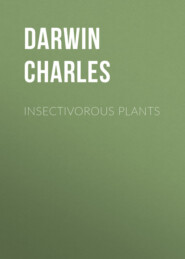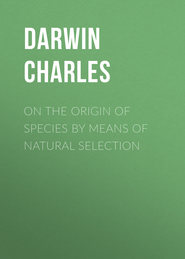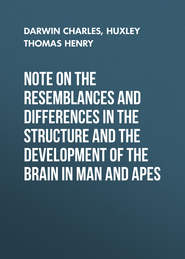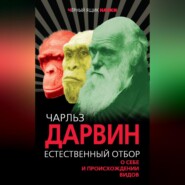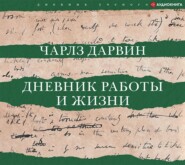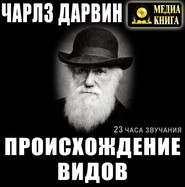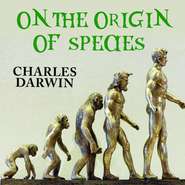По всем вопросам обращайтесь на: info@litportal.ru
(©) 2003-2024.
✖
Charles Darwin: His Life Told in an Autobiographical Chapter, and in a Selected Series of His Published Letters
Настройки чтения
Размер шрифта
Высота строк
Поля
"On the Zoological Geography of the Malay Archipelago." —Linn. Soc. Journ. 1860.
192
The late Sir Charles Bunbury, well known as a Paleo-botanist.
193
By Professor Henslow.
194
The translator of the first German edition of the Origin.
195
Spectator, March 24, 1860. There were favourable notices of the Origin by Huxley in the Westminster Review, and Carpenter in the Medico-Chir. Review, both in the April numbers.
196
François Jules Pictet, in the Archives des Science de la Bibliothèque Universelle, Mars 1860.
197
Edinburgh Review, April, 1860.
198
April 7, 1860.
199
My father wrote (Gardeners' Chronicle, April 21, 1860, p. 362): "I have been much interested by Mr. Patrick Matthew's communication in the number of your paper dated April 7th. I freely acknowledge that Mr. Matthew has anticipated by many years the explanation which I have offered of the origin of species, under the name of natural selection. I think that no one will feel surprised that neither I, nor apparently any other naturalist, had heard of Mr. Matthew's views, considering how briefly they are given, and that they appeared in the appendix to a work on Naval Timber and Arboriculture. I can do no more than offer my apologies to Mr. Matthew for my entire ignorance of his publication. If another edition of my work is called for, I will insert to the foregoing effect." In spite of my father's recognition of his claims, Mr. Matthew remained unsatisfied, and complained that an article in the Saturday Analyst and Leader, Nov. 24, 1860, was "scarcely fair in alluding to Mr. Darwin as the parent of the origin of species, seeing that I published the whole that Mr. Darwin attempts to prove, more than twenty-nine years ago." It was not until later that he learned that Matthew had also been forestalled. In October 1865, he wrote Sir J. D. Hooker: – "Talking of the Origin, a Yankee has called my attention to a paper attached to Dr. Wells' famous Essay on Dew, which was read in 1813 to the Royal Soc., but not [then] printed, in which he applies most distinctly the principle of Natural Selection to the races of Man. So poor old Patrick Matthew is not the first, and he cannot, or ought not, any longer to put on his title-pages, 'Discoverer of the principle of Natural Selection'!"
200
This refers to a "savage onslaught" on the Origin by Sedgwick at the Cambridge Philosophical Society. Henslow defended his old pupil, and maintained that "the subject was a legitimate one for investigation."
201
"The battle rages furiously in the United States. Gray says he was preparing a speech, which would take 1½ hours to deliver, and which he 'fondly hoped would be a stunner.' He is fighting splendidly, and there seem to have been many discussions with Agassiz and others at the meetings. Agassiz pities me much at being so deluded." – From a letter to Hooker, May 30th, 1860.
202
The statement as to authorship was made on the authority of Robert Chambers.
203
In a letter to Mr. Huxley my father wrote: – "Have you seen the last Saturday Review? I am very glad of the defence of you and of myself. I wish the reviewer had noticed Hooker. The reviewer, whoever he is, is a jolly good fellow, as this review and the last on me showed. He writes capitally, and understands well his subject. I wish he had slapped [the Edinburgh reviewer] a little bit harder."
204
Man's Place in Nature, by T. H. Huxley, 1863, p. 114.
205
See the Nat. Hist. Review, 1861.
206
It was well known that Bishop Wilberforce was going to speak.
207
Quarterly Review, July 1860.
208
Sir John Lubbock also insisted on the embryological evidence for evolution. – F. D.
209
Mr. Fawcett wrote (Macmillan's Magazine, 1860): – "The retort was so justly deserved and so inimitable in its manner, that no one who was present can ever forget the impression that it made."
210
This agrees with Professor Victor Carus's recollection.
211
See Professor Newton's interesting Early Days of Darwinism in Macmillan's Magazine, Feb. 1888, where the battle at Oxford is briefly described.
212
Quarterly Review, July 1860. The article in question was by Wilberforce, Bishop of Oxford, and was afterwards published in his Essays Contributed to the Quarterly Review, 1874. In the Life and Letters, ii. p. 182, Mr. Huxley has given some account of this article. I quote a few lines: – "Since Lord Brougham assailed Dr. Young, the world has seen no such specimen of the insolence of a shallow pretender to a Master in Science as this remarkable production, in which one of the most exact of observers, most cautious of reasoners, and most candid of expositors, of this or any other age, is held up to scorn as a 'flighty' person, who endeavours 'to prop up his utterly rotten fabric of guess and speculation,' and whose 'mode of dealing with nature' is reprobated as 'utterly dishonourable to Natural Science.'" The passage from the Anti-Jacobin, referred to in the letter, gives the history of the evolution of space from the "primæval point or punctum saliens of the universe," which is conceived to have moved "forward in a right line, ad infinitum, till it grew tired; after which the right line, which it had generated, would begin to put itself in motion in a lateral direction, describing an area of infinite extent. This area, as soon as it became conscious of its own existence, would begin to ascend or descend according as its specific gravity would determine it, forming an immense solid space filled with vacuum, and capable of containing the present universe."
The following (p. 263) may serve as an example of the passages in which the reviewer refers to Sir Charles Lyell: – "That Mr. Darwin should have wandered from this broad highway of nature's works into the jungle of fanciful assumption is no small evil. We trust that he is mistaken in believing that he may count Sir C. Lyell as one of his converts. We know, indeed, the strength of the temptations which he can bring to bear upon his geological brother… Yet no man has been more distinct and more logical in the denial of the transmutation of species than Sir C. Lyell, and that not in the infancy of his scientific life, but in its full vigour and maturity." The Bishop goes on to appeal to Lyell, in order that with his help "this flimsy speculation may be as completely put down as was what in spite of all denials we must venture to call its twin though less instructed brother, the Vestiges of Creation."
With reference to this article, Mr. Brodie Innes, my father's old friend and neighbour, writes: – "Most men would have been annoyed by an article written with the Bishop's accustomed vigour, a mixture of argument and ridicule. Mr. Darwin was writing on some parish matter, and put a postscript – 'If you have not seen the last Quarterly, do get it; the Bishop of Oxford has made such capital fun of me and my grandfather.' By a curious coincidence, when I received the letter, I was staying in the same house with the Bishop, and showed it to him. He said, 'I am very glad he takes it in that way, he is such a capital fellow.'"
213
April 10th, 1860. Dr. Gray criticised in detail "several of the positions taken at the preceding meeting by Mr. [J. A.] Lowell, Prof. Bowen and Prof. Agassiz." It was reprinted in the Athenæum, Aug. 4th, 1860.
214
On Sept. 26th, 1860, he wrote in the same sense to Gray: – "You never touch the subject without making it clearer. I look at it as even more extraordinary that you never say a word or use an epithet which does not express fully my meaning. Now Lyell, Hooker, and others, who perfectly understand my book, yet sometimes use expressions to which I demur."
215







